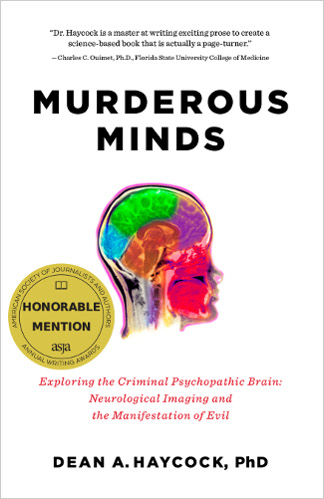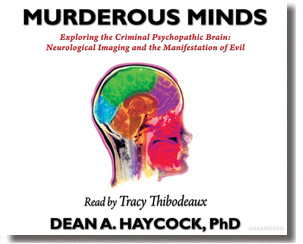Books // Murderous Minds

Is there a biological basis for evil? From neurological imaging to behavioral studies, Dean Haycock's account of the groundbreaking research reveals what scientists are learning about the psychopaths living among us.
How many times have you seen a murder on the news or on a TV show like CSI: Crime Scene Investigation, and said to yourself, "How could someone do something like that?"
Today, neuroscientists are imaging, mapping, testing and dissecting the source of the worst behavior imaginable in the brains of the people who lack a conscience: psychopaths. Neuroscientist Dean Haycock examines the behavior of real life psychopaths and discusses how their actions can be explained in scientific terms, from research that literally looks inside their brains to understanding how psychopaths, without empathy but very goal-oriented, think and act the way they do. Some don’t commit crimes at all, but rather make use of their skills in the boardroom.
But what does this mean for lawyers, judges, psychiatrists, victims and readers--for anyone who has ever wondered how some people can be so bad. Could your nine-year-old be a psychopath? What about your co-worker? The ability to recognize psychopaths using the scientific method has vast implications for society, and yet is still loaded with consequences.
Reviews for Murderous Minds
"...an informed, masterful account of the theory, research, controversies, and issues surrounding the construct of psychopathy . . . His balanced and scientifically sound coverage of the literature and issues are admirable and refreshing. Readers not familiar with the technology and procedures of neuroscience will appreciate the way in which Haycock makes the science understandable, interesting, and relevant. Highly recommended." -- Robert D. Hare, Ph.D., author of Without Conscience: The Disturbing World of the Psychopaths Among Us and developer of the the Psychopathy Checklist-Revised.
"[Haycock's] writing is colored by a strong commitment to narrative, with almost every chapter opening with vivid stories of psychopathic violence or diagnosis, and he peppers his accessible discussion of brain structure with references to comic books, science fiction, Norman Mailer, the television shows Boston Legal and The Sopranos, and the Lord of the Flies. He is what Slavoj Žižik would sound like if he were a neuroscientist instead of a Laconian theorist. Overall, the book offers an excellent account of the current state of play in mapping psychopathic behavior with neuroscience, giving evenhanded time to both the older school of assessment which relies on interviews and a numerical scale of traits (lack of remorse, mendacity, sexual promiscuity, and so on), and the new cowboys of the fMRI. It should be required reading for anyone who wants to know more about the brains of violent criminals." -- Mark Kingwell, Professor of Philosophy at the University of Toronto and author of Measure Yourself Against the Earth.
"In this fascinating page-turner, neurobiologist Haycock tries to uncover the correlation between brain abnormalities and violent behavior, and whether one guarantees the other . . . Haycock concludes "that the neurological profile of the criminal psychopath is consistent with key features of psychopathy: a lack of moral sense and a lack of empathy." In the end, though, he admits that criminal responsibility cannot be traced unequivocally to a neurological basis but that such research can certainly begin an important conversation in the legal world." -- Publisher's Weekly
"By using a combination of current and historical case studies involving criminals and patients with brain damage, some of whom have been diagnosed as psychopathic, combined with the most recent neuroimaging research, Haycock provides an up-to-date picture of brain function and dysfunction . . . VERDICT: Haycock's solid overview of neurobiology is recommended for those who deal with criminal psychopaths, but also for anyone who reports on or who is interested in the subject." -- Library Journal
Haycock presents scientific evidence that supports his position, including data from fMRI studies that point to physiological differences between the brains of criminal psychopaths and those of nonpsychopaths. But the existence of a neurologically identifiable signature in the brains of psychopaths is merely the tip of Haycock's iceberg. The real tangle involves the implications--social, legal, judicial, and scientific--of the potential that we could predict someone would become a murderer from his or her brain scan. -- The Scientist Magazine
"Haycock mixes in just enough real-world examples and plain language to make the challenge interesting instead of frustrating." -- Bookzilla
"Murderous Minds is a gem. I became completely immersed in it and lost myself in the world Haycock created at the nexus of science, story, history, complete with downright wondrous narrative yarns to boot." -- James Fallon, Ph.D., author of The Psychopath Inside
"Can the tendency for criminally psychopathic behaviors be identified by analyzing neurological images? If so, what consequence does this have for science and society? Psychopaths are everywhere―an estimated 1 in 100 adults qualify. Most are nonviolent but not all: One subset of this group, criminal psychopaths, have aggressive and sometimes-violent tendencies and often fail to exhibit empathy or remorse despite knowing the difference between right and wrong. But Is it moral or legal to use this information to try to predict violent crimes or to influence a jury deciding a verdict? The author explores these tricky issues in accessible and insightful chapters that break down the science behind the data while using narratives of high-profile criminals―e.g., Columbine shooters Eric Harris and Dylan Klebold, Mafia contract killer Richard “The Ice Man” Kuklinski, rapist and murderer Brian Dugan―to provide chilling real-lifeexamples of criminally psychopathic behaviors. Part true crime, part neuroscience and a page-turner from start to finish." -- Kirkus Reviews
Audiobook Version

Click for audio sample
Presented by Cherry Hill Publishing.
Narrated by Tracy Thibodeaux.
Now available on Audible
.Thibodeaux was hit by the broadcasting bug a year before he completed his undergraduate degree in Education. He went on to enjoy a twenty-year career in radio, accomplishing on-air success as a DJ and host in several morning and afternoon drive time slots and behind the scenes as a Program Director, Music Director and News Director. Tracy has voiced many commercial, instructional, educational, narrative, and public address projects. When he isn't in his studio voicing a gig, he hosts a podcast, Pods o' Pop, which features some of the world's greatest and most accomplished singers and singer-songwriters and their music.
Find Tracy behind the mic of other outstanding Cherry Hill Publishing audiobook productions including Nameless and When White Fades to Black, by Joe Conlan, Frame 232, by Wil Mara, and Miracle Man, by William R. Leibowitz.


